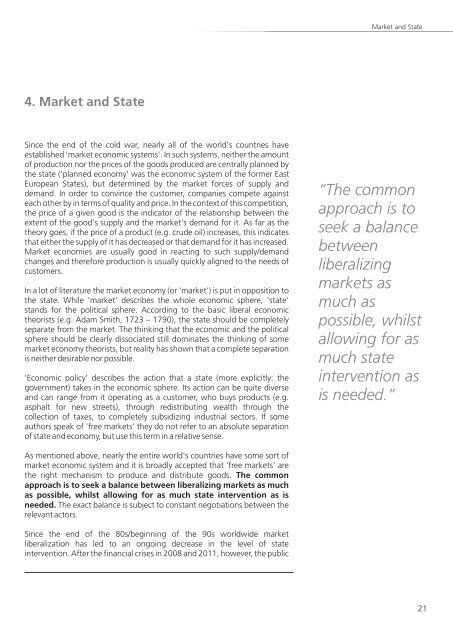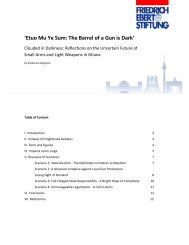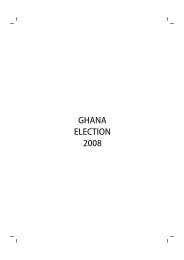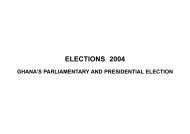Basics on Social Democracy - Friedrich-Ebert-Stiftung, Ghana Office
Basics on Social Democracy - Friedrich-Ebert-Stiftung, Ghana Office
Basics on Social Democracy - Friedrich-Ebert-Stiftung, Ghana Office
Create successful ePaper yourself
Turn your PDF publications into a flip-book with our unique Google optimized e-Paper software.
Market and State<br />
4. Market and State<br />
Since the end of the cold war, nearly all of the world's countries have<br />
established 'market ec<strong>on</strong>omic systems'. In such systems, neither the amount<br />
of producti<strong>on</strong> nor the prices of the goods produced are centrally planned by<br />
the state ('planned ec<strong>on</strong>omy' was the ec<strong>on</strong>omic system of the former East<br />
European States), but determined by the market forces of supply and<br />
demand. In order to c<strong>on</strong>vince the customer, companies compete against<br />
each other by in terms of quality and price. In the c<strong>on</strong>text of this competiti<strong>on</strong>,<br />
the price of a given good is the indicator of the relati<strong>on</strong>ship between the<br />
extent of the good's supply and the market's demand for it. As far as the<br />
theory goes, if the price of a product (e.g. crude oil) increases, this indicates<br />
that either the supply of it has decreased or that demand for it has increased.<br />
Market ec<strong>on</strong>omies are usually good in reacting to such supply/demand<br />
changes and therefore producti<strong>on</strong> is usually quickly aligned to the needs of<br />
customers.<br />
In a lot of literature the market ec<strong>on</strong>omy (or 'market') is put in oppositi<strong>on</strong> to<br />
the state. While 'market' describes the whole ec<strong>on</strong>omic sphere, 'state'<br />
stands for the political sphere. According to the basic liberal ec<strong>on</strong>omic<br />
theorists (e.g. Adam Smith, 1723 – 1790), the state should be completely<br />
separate from the market. The thinking that the ec<strong>on</strong>omic and the political<br />
sphere should be clearly dissociated still dominates the thinking of some<br />
market ec<strong>on</strong>omy theorists, but reality has shown that a complete separati<strong>on</strong><br />
is neither desirable nor possible.<br />
'Ec<strong>on</strong>omic policy' describes the acti<strong>on</strong> that a state (more explicitly: the<br />
government) takes in the ec<strong>on</strong>omic sphere. Its acti<strong>on</strong> can be quite diverse<br />
and can range from it operating as a customer, who buys products (e.g.<br />
asphalt for new streets), through redistributing wealth through the<br />
collecti<strong>on</strong> of taxes, to completely subsidizing industrial sectors. If some<br />
authors speak of 'free markets' they do not refer to an absolute separati<strong>on</strong><br />
of state and ec<strong>on</strong>omy, but use this term in a relative sense.<br />
“The comm<strong>on</strong><br />
approach is to<br />
seek a balance<br />
between<br />
liberalizing<br />
markets as<br />
much as<br />
possible, whilst<br />
allowing for as<br />
much state<br />
interventi<strong>on</strong> as<br />
is needed.”<br />
As menti<strong>on</strong>ed above, nearly the entire world's countries have some sort of<br />
market ec<strong>on</strong>omic system and it is broadly accepted that 'free markets' are<br />
the right mechanism to produce and distribute goods. The comm<strong>on</strong><br />
approach is to seek a balance between liberalizing markets as much<br />
as possible, whilst allowing for as much state interventi<strong>on</strong> as is<br />
needed. The exact balance is subject to c<strong>on</strong>stant negotiati<strong>on</strong>s between the<br />
relevant actors.<br />
Since the end of the 80s/beginning of the 90s worldwide market<br />
liberalizati<strong>on</strong> has led to an <strong>on</strong>going decrease in the level of state<br />
interventi<strong>on</strong>. After the financial crises in 2008 and 2011, however, the public<br />
21









